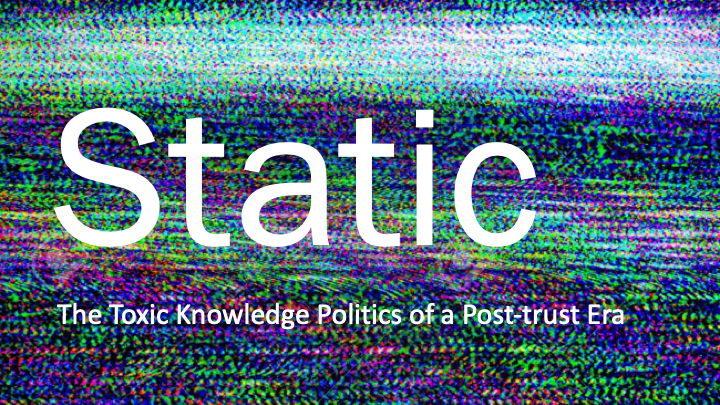Image

Source
Adams, James. 2019. “Created Image: Crowds on Demand: Toxicity and Symbolic Form.” In Static: The Toxic Knowledge Politics of a Post-trust Era, created by James Adams. In Visualizing Toxic Subjects Digital Exhibit, curated by James Adams and Kim Fortun. The Center for Ethnography. June.
Language
English
Contributor(s)
Group Audience
English

In light of a radical spike in its use, the English Oxford Dictionary (EOD) declared “post-truth” the 2016 Oxford word of the year. Two years later, the EOD decided on an equally troubling descriptor, “toxic”, as best representing “the ethos, mood, [and] preoccupations” of 2018. In this collection of images, I attempt to rethink post-truth and toxicity together, exploring visualization as a tactic for developing and representing a conception of epistemological “static” as a particularly toxic form of contemporary knowledge politics. Building off of Kockelman’s analysis of “enemies, parasites, and noise” (2010), toxicity is here conceived as a particular type of third (a relation to a relation), one that is obstructive, corruptive, and/or corrosive to a previously established and effective channel of communication. Static, then, is a token of this type; it functions by flooding the channel with enough “alternative signals” that messages become unclear or distorted and the channel less effective, if not completely inoperative. In Crowds on Demand, the interference of professional actors taking up as local stakeholders muddled the message received by the New Orleans City Council, therein undermining public trust in the utility of traditional symbolic forms of democratic politics. In Search for California, the equal intensities of contradicting representations of California—as a state of paradise and/or perdition—mimics the unintelligibility of “white noise,” creating a simulation of the paralysis induced when the blurring of fact, fiction, and fantasy impedes our ability to trust even our own impressions and desires.
References:
Kockelman, Paul. 2010. “Enemies, Parasites, and Noise:How to Take Up Residence in a System Without Becoming a Term in It.” Journal of Linguistic Anthropology 20 (2): 406–21. https://doi.org/10.1111/j.1548-1395.2010.01077.x.
“Word of the Year 2016 Is... | Oxford Dictionaries.” n.d. Oxford Dictionaries | English. Accessed May 10, 2019. https://en.oxforddictionaries.com/word-of-the-year/word-of-the-year-2016.
“Word of the Year 2018 Is... | Oxford Dictionaries.” n.d. Oxford Dictionaries | English. Accessed May 10, 2019. https://en.oxforddictionaries.com/word-of-the-year/word-of-the-year-2018.